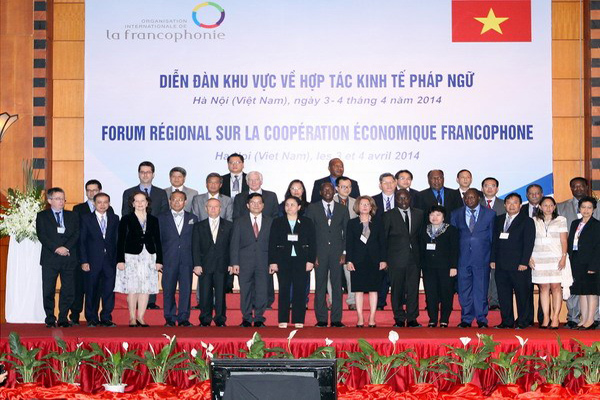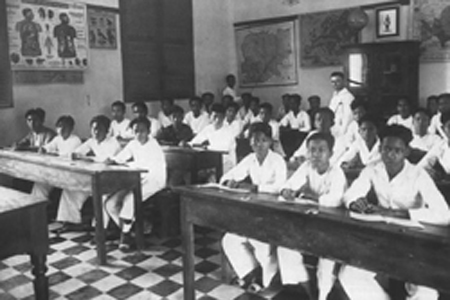Speech by the author at the Fiench Embassy on the occasion of his being awarded the Academic Palms (1992).
I am honored to be the first cultural worker from Hanoi to be decorated by the French State since the Indochina war. The "Palmes Academiques”, an award originally conceived by Napoleon I does not however remind me of his military conquests. Instead, it makes me think about the rich spiritual harvests that the seeds sown by the revolution of 1789 have brought into being in foreign lands, harvests well beyond the expectations of the Emperor.
Empires fall. Even the colonial empire came to an end. But culture remains. The Vietnamese people have lived through several such experiences in the course of their eventful history.
Situated at the crossroads of civilizations, our country is a bridge between the Chinese and the Indian worlds, a meeting place between the East and the West. Vietnam has been strongly influenced by two cultures: Chinese culture for nearly two millennia and Western culture, through the intermediary of France, at the beginning of its modern history. However, the process of cultural enrichment has been characterized, according to eminent Vietnamologists Pierre Huard and Maurice Durand, by "the constant effort of Vietnamese culture, over the course of centuries, not to assimilate any foreign elements without trying to impose its persona! Stamp on them".

After the rupture in relations of 1946, the majority of Vietnamese who had been educated under the French system were cut off from sources of French culture In general, the younger generations have limited knowledge of the French language. Aware of the harm that this discontinuity might cause to the evolution of their culture which is trying to assert in a world in ebullition, older Vietnamese intellectuals have tried, each in their own way, to remedy the situation. It was in these circum stances that my Sketches for a Portrait of French Culture came into being. There is abundant literature in the Vietnamese language about Asian cultures, particularly about the Chinese. But Vietnamese readers do not have any works available to them which provide a comprehensive view of French culture and analyze its impact on their own culture. Pending the publication of a scholarly and exhaustive work which would fill this void, I have tried to make a modest contribution with my own writings. My book is a testimony, a testimony from the author, from his friends, from Vietnamese and French people, both living and dead. It seeks to define French culture, often starting from personal impressions and the realities of Vietnam. I have been moved by the warmth with which my book has been received. This testifies to the lasting attachment of the Vietnamese intellectuals to authentic values. We are Vietnamese sensitive to the universal nature of French culture and its spirit of dialogue.
As Andre Gide has stressed, "the truths which it teaches us... are general, human, capable of reaching all kinds of people... French thought, at any stage of its development, of its history, present for our consideration a dialogue, a pathetic and unceasing dialogue... a dialogue between the secular tradition... and free thought, the spirit of doubt and examination that work for the slow and gradual emancipation of the individual".
Some French people are concerned that the French language is in decline in Vietnam. They should not be over anxious. With the increasingly evident Franco-Vietnamese rapprochement, French is regaining ground, especially since the establishment of the "Alliance Frangaise". Personally, I believe francophone should be approached in other ways in Vietnam. In fact, the language - the signifier - is important but still more important is culture - the signified - which can be carried out by works of recreation, diffusion and, above all, translation. How many Frenchmen today read ancient Greek or Latin? Yet, the Greco-Latin spirit has left its indelible impression on French speech, feelings and thought. The Greco-Latin soul lives on in Corneille's Horace, Andromaque by Racine, Tele- maque by Fenelon, Flaubert's Salambo, Thais by Anatole France, Electre by Giraudoux, Caligula by Camus and Yourcenar's Hadrien... as if under the influence of Buddhist Karma.
With my belief in the priority of culture over language, apart from a Handbook for Users of the French Language, I have concentrated my work on a Dictionary of Foreign Authors in which about 300 French authors are mentioned, a Dictionary of Foreign Literary Works in which 400 French works are analyzed and a Concise Dictionary of Philosophy comprising over 70 French thinkers.
Let me tell you something in confidence. When I was a schoolboy, perhaps enchanted by images of James Hilton's Shangri La and Mr. Chips, I dreamed of becoming a school teacher in a remote village in the mountains of northern Vietnam. But like so many others, my fate was decided for me, I became a so-called ”importer and exporter" of culture. Along with my French and Vietnamese friends, such as Francoise Correze, Nguyen Khac Vien, Alice Kahn and Mireille Gansel, I have made the culture and literature of Vietnam known to other countries through the medium of the French language. I have also contributed to the diffusion of knowledge about foreign cultures in Vietnam.
I have to admit that as a "cultural trader", my own weakness is for "articles de Paris".



